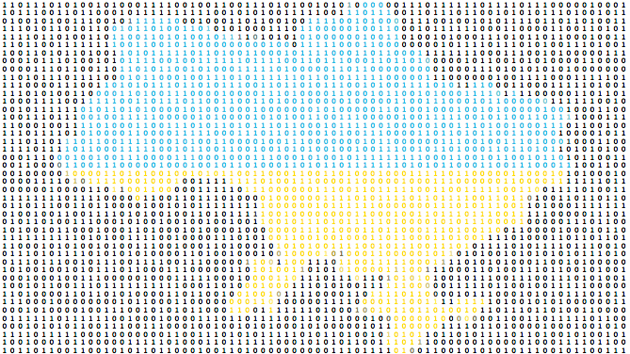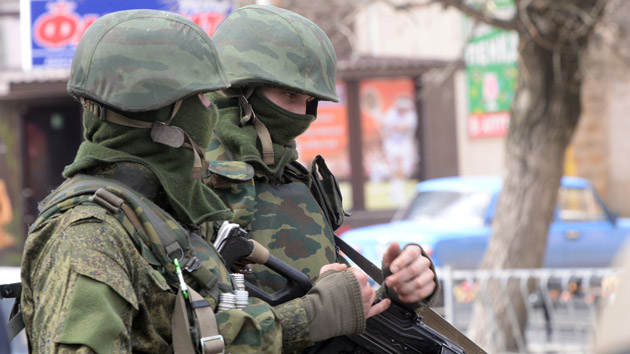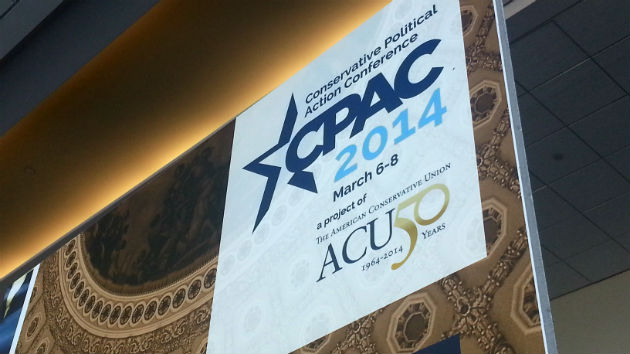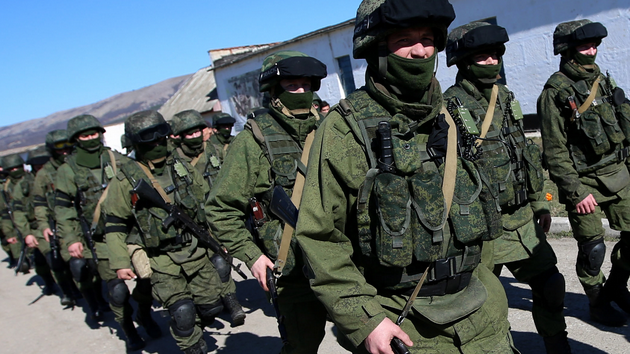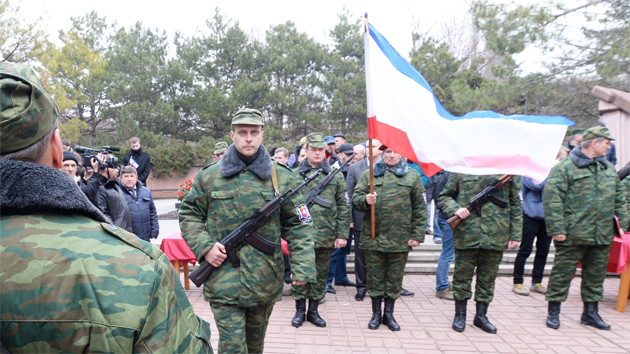
A newly recruited militia unit takes an oath of allegiance to the people of Crimea.Valery Matytsin/ITAR-TASS/ZUMA
This article is being updated as news breaks. Click here for the latest.
Russia has deployed 10,000 troops to multiple locations along the Ukraine-Russia border, deepening fears that the simmering crisis in the Crimean peninsula is about to escalate into full-scale warfare. In London on Friday, Secretary of State John Kerry attempted to broker a last-minute deal with Russia’s foreign minister to ratchet down the crisis, but their talks “ended inconclusively,” according to the New York Times. This weekend, voters in Crimea, an autonomous region of about 2 million in southeastern Ukraine, will vote on a referendum that would give citizens the option of asserting independence from Ukraine, or becoming part of Russia. (Remaining part of Ukraine isn’t an option.) The United States and European Union leaders have called the referendum back-door annexation,” which would bring international consequences. Here’s what you need to know about the current state of play. Check back frequently, since we’ll update this post as events unfold.
Western leaders are furious: On Thursday, German Chancellor
.@JohnKerry: We believe this referendum violates international law and is illegal under #Ukraine‘s constitution.
— StateDept Live (@StateDeptLive) March 14, 2014
If Crimea joins Russia, it could take Ukrainian gas and oil reserves with it: Russian exports account for about one-third of Europe’s gas consumption and those pipelines run smack through Ukraine. As Mother Jones‘ James West points out, “Russia has long been able to use Ukraine as an energy choke point.” On Thursday, Russia’s state-run RIA Novosti news agency reported that authorities in Crimea have been securing offshore gas and oil in the region. Crimean parliamentary speaker Vladimir Konstantinov reportedly said: “These deposits and the platform fully become the property of the Republic of Crimea…We have guarded them. These are our fields and we will fight for them.”
Putin is cracking down on Russian press: Julia Ioffe reports in The New Republic:
What began just days before the Olympics with a Kremlin attack on Dozhd, the last independent television station in Russia, has now extended to Lenta.ru, arguably the best news site in Russia. On Wednesday, the site’s editor-in-chief was fired and replaced with a Kremlin loyalist, and the whole staff quit in protest. Yesterday, the Kremlin went full-China on the Internet, the holy of holies of the Russian opposition. Using some flimsy legal pretexts, it banned access to various oppositional news sites, to the website of Moscow’s biggest radio station, and to the blog of Alexey Navalny, who is currently under house arrest.
Russia maintains that it’s not going to invade: Earlier this month, President Vladimir Putin said that Russia is not planning to annex Crimea and he would leave it up to citizens in the region to determine their future. He also said force would only be used as “a last resort.”? As recently as Friday, Russian officials have maintained that an invasion is still off the table:
LONDON (AP) – Russian Foreign Minister Lavrov says Russia has no plans to invade southeastern Ukraine
— Josh Lederman (@joshledermanAP) March 14, 2014
But Western leaders aren’t optimistic that Putin will back down from annexing Crimea, after the referendum vote. According to the New York Times, “As of Friday, there had been no sign that President Vladimir V. Putin was prepared to take the ‘off ramp’ that the Obama administration has repeatedly offered.?” Russian foreign minister Sergey Lavrov declared on Friday that Russia and the United States “have no common vision” about the crisis.
UPDATE, March 14, 2014, 3:00 p.m. EDT (Dana Liebelson): The Pentagon is sending 25,000 ready-to-eat meals to Ukraine, according to the Associated Press. Two US representatives have asked President Obama to put names of Russian officials responsible for human rights abuses on the Magnitsky list, a public list of Russians created in 2012 as part of the Magnitsky Act, to punish Russian officials who have committed human rights violations. Members of the list are prohibited from entering the US or using the US banking system.
A photo of Lavrov and Kerry that just about says it all: pic.twitter.com/IzFHsXai1I h/t @Shlegel
— Simon Shuster (@shustry) March 14, 2014
UPDATE 2, March 14, 2014, 3:35 p.m. EDT (Hannah Levintova): Mimicking the language used to justify their invasion of Crimea, the Russian foreign ministry has issued a warning that they reserve the right to intervene in the city of Donetsk to protect lives after a series of clashes Thursday night led to at least one death and dozens of injuries.
Donetsk is a primarily Russian-speaking city in eastern Ukraine, not far from the Russian border. The clashes began yesterday after hundreds of demonstrators chanting Pro-Russian slogans broke through a police cordon and stormed a separate group protesting Russia’s invasion of Crimea and calling for “a united Ukraine.”
Here’s video of the incident heating up:
UPDATE 3, March 14, 2014, 8:06 p.m. EDT (Eric Wuestewald): Another two people were reportedly killed and five injured during clashes in the eastern Ukrainian city of Kharkiv Friday. There have been conflicting reports over who was injured and who was responsible for the attack, but many are alleging armed pro-Russian groups or the Ukrainian nationalist group Right Sector may have provoked it.
Kharkiv is Ukraine’s second largest city after Kiev, and historically, was the country’s first Soviet capital. Like Donetsk, it’s also close to the Russian border. As a result, large pro-Russian rallies have been common, which some are predicting could become a litmus test for the future direction of the country.
Update 4, March 15, 2014, 4:15 PM EDT (Dana Liebelson): 60 Russian troops in six helicopters have crossed into Ukraine, according to Ukrainian officials, taking control of the village of Strilkove and leading to the first reports of Russian invasion outside of Crimea. The New York Times reports that troops also seized a gas plant and “the action was Russia’s most provocative since its forces took over Crimea two weeks ago.” Ukraine’s acting leader Oleksander Turchinov said: “The situation is very dangerous. I’m not exaggerating. There is a real danger from threats of invasion of Ukrainian territory. We will reconvene on Monday at 10am.”
Update 5, March 15, 4:45 p.m. EDT (Hannah Levintova): Earlier today, 50,000 people took part in a “peace march” in Moscow against Russia’s intervention in Crimea. Protestors marched waving both Russian and Ukrainian flags, and then gathered on the Prospect Sakharova, where massive anti-Putin rallies took place in 2012. Some protestors chanted: “The main enemy is the Kremlin. No to fascism, no to imperialism.”
Here’s a Russian-language newscast showing the march:
Former US ambassador to Russia Michael McFaul, who stepped down from his post in February, wrote a statement today about the situation in Ukraine on Facebook. Here’s an excerpt:
Putin’s recent decisions represent a giant step backwards. Tragically, we are entering a new period with some important differences, but many similarities to the Cold War. The ideological struggle between autocracy and democracy is resurgent. Protection of European countries from Russian aggression is paramount again. Shoring up vulnerable states , including first and foremost Ukraine, must become a top priority again for the US and Europe. And doing business with Russian companies will once again become politicized. Most tragically, in seeking to isolate the Russian regime, many Russians with no connection to the government will also suffer the effects of isolation. My only hope is that this dark period will not last as long as the last Cold War.
Update 6, March 16, 5:30 a.m. EDT (Hannah Levintova): Several NATO websites were hit by cyber-attacks in the hours preceding the start of referendum voting in Crimea. A group calling itself “cyber-berkut” took credit for the attack, saying they targeted NATO for its interference in Ukraine. “We will not allow NATO occupiers in our homeland,” the collective wrote on their site. Their name references the berkut, an especially-feared faction of Ukraine’s police force used by ousted President Viktor Yanukovych that has since been disbanded. A NATO spokeswoman wrote on Twitter that the integrity of NATO data and systems was not effected and that experts were working to restore the sites.
Update 7, March 16, 11:30 AM EDT (Dana Liebelson): As the referendum vote wraps up in Ukraine, a German research group, GfK, has conducted early polling that anticipates a landslide vote for secession, with 70% of Crimeans participating in the vote choosing to join Russia; 11% choosing increased autonomy within Ukraine. There are also reports of Russian and Ukrainian troops building up near the border. Here is a video posted by The Wire of Russian tanks moving towards southwest Russia:
Update 8, March 16, 2:15 p.m. EDT (Eric Wuestewald): RT is reporting that 93% of those who participated in the Crimean referendum voted to seceed from Ukraine and become part of Russia, according to exit polls. Official results are expected later. Crimea’s Prime Minister Sergei Aksyonov has responded to the news by announcing Crimea would join Russia in “as tight a timeframe as possible.”
The White House released a statement reaffirming its opposition to the referendum and called on members of the international community to condemn and “impose costs” on Russia’s actions:
The United States has steadfastly supported the independence, sovereignty, and territorial integrity of Ukraine since it declared its independence in 1991, and we reject the “referendum” that took place today in the Crimean region of Ukraine. This referendum is contrary to Ukraine’s constitution, and the international community will not recognize the results of a poll administered under threats of violence and intimidation from a Russian military intervention that violates international law.
Update 9, March 16, 4:50 p.m. EDT (Hannah Levintova): The AP, along with several of Russia’s state-funded news networks, are reporting that with about 50 percent of ballots counted, more than 95 percent of Crimea’s voters have opted to join Russia and secede from Ukraine. Reports are also coming out saying that some journalists were prohibited from entering the polling stations to observe the vote count.
Update 10, March 17, 10:15 a.m. EDT (Dana Liebelson): Since the referendum, European Union foreign ministers have imposed travel restrictions and frozen the assets of 21 officials from Ukraine and Russia. In the mean time, Crimea has moved quickly to join Russia: Crimean lawmakers have passed a resolution declaring that Ukrainian laws no longer apply in Crimea. Crimean legislators have also adopted the Russian ruble as an official currency and plan to move Crimea to Moscow Standard Time, according to CNN. Russia has proposed putting together an international group of diplomats to solve the political crisis, but has issued proposals that are unlikely to be accepted by the international community, according to the New York Times—such as allowing Crimea to “determine its own destiny.”
On Monday morning, President Obama announced a new executive order that imposes sanctions on “named officials of the Russian government, any individual or entity that operates in the Russian arms industry, and any designated individual or entity that acts on behalf of, or that provides material or other support to, any senior Russian government official.” So far, seven Russian government officials are on the list: Vladislav Surkov, Sergey Glazyev, Leonid Slutsky, Andrei Klishas, Valentina Matviyenko, Dmitry Rogozin, and Yelena Mizulina. The Treasury Department has issued sanctions against four other individuals “for their actions or policies that threaten the peace, security, stability, sovereignty, or territorial integrity of Ukraine.” Those individuals are Crimea-based separatist leaders Sergey Aksyonov and Vladimir Konstantinov; former Ukrainian presidential chief of staff Viktor Medvedchuk; and former President of Ukraine Viktor Yanukovych.
Update 11, March 17, 10:45 a.m. EDT (Dana Liebelson): In a televised statement, President Obama said that Vice President Joe Biden will depart tonight to Europe to meet with NATO allies, and the President will be traveling to Europe next week. Obama said that in wake of the sanctions announcement this morning, his administration will continue to calibrate the US response depending on whether Russia chooses to escalate or deescalate the crisis. Obama reiterated that he believes there is still a path to resolve the crisis diplomatically, requesting that Russia pull its forces in Crimea back to their bases; deploy additional international monitors; and continue to work with the Ukrainian government. Obama says the United States will offer economic support to Ukraine, noting that, “The United States stands with the people of Ukraine and their right to determine their own destiny.”
Update 12, March 17, 2:45 p.m. EDT (Hannah Levintova): Putin has just signed an order making Crimea an independent state. The presidential press service declared that the order enters into force with Putin’s signature.
Earlier today, NATO announced that it is pulling out of a US Army Europe training exercise that was to take place in Russia this summer, but that a similar exercise to be held in Ukraine will go on as planned. Ukrainian leaders have also announced that the country’s military will not be pulling out of its bases in Crimea despite a truce agreement with Russia that gives them until March 21, this Friday, to do so.
“Crimea was, is, and will be our territory,” Ukraine Defense Minister Ihor Tenyukh said while speaking at the Ukrainian Crisis Media Center today.
Update 13, March 18, 6:45 a.m. EDT (Ben Dreyfuss): On Tuesday, Putin notified the Russian parliament that he intends to annex Crimea and make it a part of the Russian Federation. In the words of the New York Times, Putin’s actions “effectively [upend] the agreements that served as the foundation of a post-Cold War order in Europe.”
Update 14, March 18, 8:15 a.m. EDT (Ben Dreyfuss): Soon after delivering a speech before the Russian parliament, Vladimir Putin signed a treaty with Crimean leaders to incorporate the “Republic of Crimea” and the city of Sevastopol into the Russian Federation. However, as the BBC points out, the rest of the world still considers Crimea a part of Ukraine. “So the ‘independent Republic of Crimea’ is a Russian invention.”
Update 15, March 18, 3:26 p.m. EDT (Eric Wuestewald): Following an attack on a Ukrainian military facility near Simferopol that left at least one dead and two injured, the Ukrainian Ministry of Defence has now authorized servicemen deployed in Crimea to use weapons in self-defense. According to the Ministry, the attack was committed by men in unmarked Russian uniforms carrying automatic guns and sniper rifles.
Update 16, March 18, 6:00 p.m. EDT (Hannah Levintova): Kazakhstan’s Ministry of Foreign Affairs has released an official statement expressing the former Soviet state’s support of the Crimea referendum and Russia’s decision to annex the territory:
Kazakhstan views the referendum that was held in Crimea as an expression of the free will of the Autonomous Republic’s population, and the decision of the Russian Federation under the circumstances is regarded with understanding.
Meanwhile, NATO’s secretary general released a statement condemning Putin’s decision:
Russia continues to violate Ukraine’s sovereignty and territorial integrity, and remains in blatant breach of its international commitments. There can be no justification to continue on this course of action that can only deepen Russia’s international isolation. Crimea’s annexation is illegal and illegitimate and NATO allies will not recognize it.
Update 17, March 19, 3:50 p.m. EDT (Hannah Levintova): Ukrainian officials have announced that they’re making plans to withdraw troops and their families from Crimea. Andriy Pirubiy, the secretary of the National Security and Defense Council of Ukraine, also said Ukraine will institute visa requirements for Russians, and will seek UN support in making Crimea a demilitarized zone and removing Russian troops. The speech came after pro-Russian militia stormed and seized the Sevastopol headquarters of the Ukrainian navy on Wednesday.
Russia’s military has begun conducting aviation exercises near other former Soviet republics. The drills, which will end in late March, include dozens of warplanes and have started in Leningrad oblast (region), which borders Finland and Estonia, and also in Karelia, which borders Finland. A senior Russian military official told Reuters that the exercises were planned back in December and have no political significance.
At the same time, Russia announced its concern over Estonia’s treatment of its Russian-speaking population at a meeting of the United Nations Human Rights Council today. A Moscow delegate compared Estonian initiatives to compel Russians in the eastern half of the country to speak Estonian to similar alleged efforts to curb Russian use in Ukraine. In recent weeks, Russia has echoed these linguistic concerns—emphasizing the need to protect Russian-speakers beyond Russia’s borders—in defense of it annexation of Crimea.
During a public speech at the Brookings Institution today, NATO Secretary General Anders Fogh Rasmussen said that Russia’s intervention in Ukraine “is the gravest threat to European stability and security since the end of the cold war.”
Update 18, March 20, 11:45 a.m. EDT (Dana Liebelson): On Thursday, President Obama announced that he is launching sanctions against 20 individuals, including senior members of the Russian government and “cronies” who hold significant resources in the Russian system, according to White House officials. Sanctions will also be launched against Bank Rossiya, Russia’s 17th largest bank, where senior Russian government officials hold accounts. President Obama has also signed an executive order that allows sanctions on “key sectors of the Russian economy,” including defense and related material. Obama reiterated that he considers the Ukraine’s referendum “illegal” and the move by Russia to annex Crimea “illegitimate.” Here’s a list of the sanction targets:
The sanctions list: pic.twitter.com/ghPhpsDVEI
— Garance Franke-Ruta (@thegarance) March 20, 2014
Update 19, March 24, 4:30 p.m. EDT (Dana Liebelson): On Monday, the New York Times reported that Russia has been booted from the Group of 8, a diplomatic forum that includes the world’s economic powerhouses, including the United States. Russia has been participating in the forum for 15 years. The Group’s leaders said in a statement: “We remain ready to intensify actions including coordinated sectoral sanctions that will have an increasingly significant impact on the Russian economy, if Russia continues to escalate this situation.”

